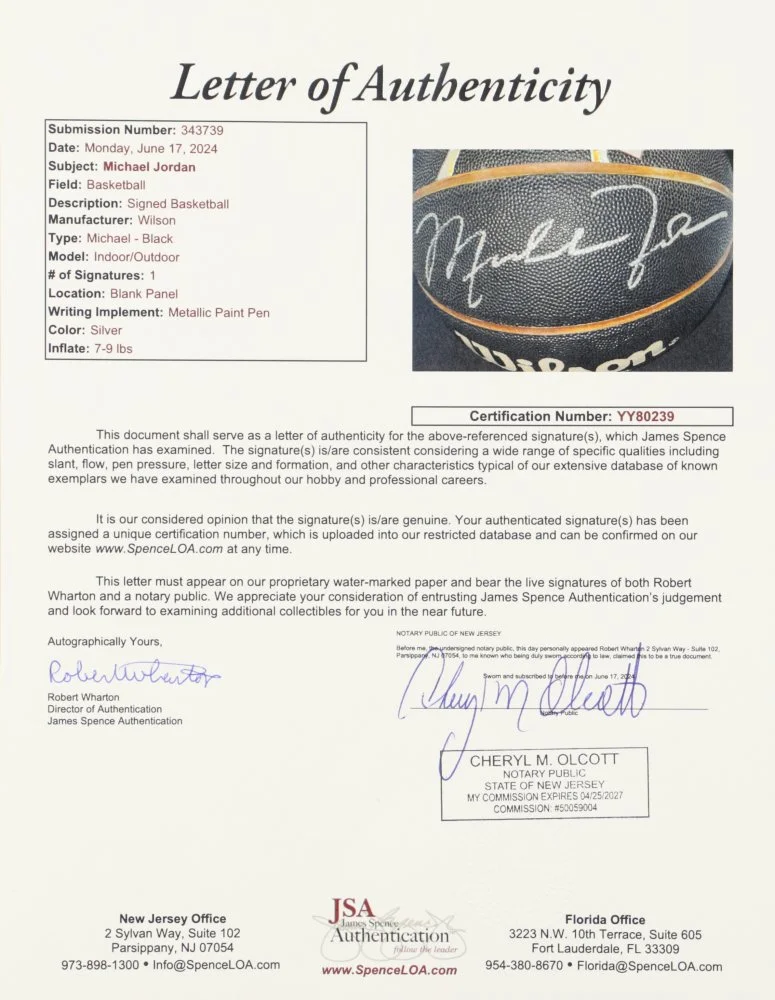How to Authenticate Your Sports Memorabilia: A Step-by-Step Guide
For collectors of sports memorabilia, avoiding fake or counterfeit pieces is the first and foremost priority. Whether it's a forged signature, a jersey that wasn’t game-worn, or a card in a fake grading slab, memorabilia that hasn’t been authenticated will likely raise red flags for serious collectors. That’s where the sports authentication process comes in. Sports memorabilia authentication can put the minds of potential buyers at ease. Through autograph authentication, or any other form of certification, doubts about the authenticity of memorabilia can be erased.
The question of how to authenticate sports memorabilia, though, might not be as simple to answer for novice collectors. For those exploring how to authenticate signed sports memorabilia, or any other piece of a collection, this is a deeper look at the process for doing so. Here is a guide to the best sports memorabilia authentication.
How to Authenticate an Autograph?
Authenticating an autograph can start with independent research. Collectors can research previous examples of the signature, and compare what they have with examples that are known to be verified. Every signature is unique, so look for elements of this person’s signature – a loop at the top of the L in their name, the number they wear after their signature, etc. – to help identify. Even if the signature looks pretty similar to preexisting examples, though, there are still some great fakes out there. This is just a first step to weed out less convincing counterfeit signatures. It also helps if the signature is one the collector watched this particular person sign. At that point, it’s likely beneficial to seek out the certificate of authentication from a reputable grading company to add legitimacy for any potential buyer. That is, if the goal is to sell the piece. If a signed ball from a collector’s childhood has a permanent place in their collection, authentication likely isn’t necessary.
For those interested in advanced technologies, methods such as an ultraviolet light or magnifying analysis can help add an extra layer of legitimacy before the item is sent off. However, these processes require an understanding of what to look for, such as inconsistent ink being used on a signature, or alterations. These strategies for deeper analysis are best left to the pros who will be authenticating the signature once it's sent off.
How to Get Sports Memorabilia Authenticated?
Services such as PSA or Beckett offer authentication services, as does James Spence Authentication. These services employ experts to cross-reference submitted signatures with signatures they know to be legitimate, before authenticating submitted signatures.
The aforementioned services make the process for submitting items to be authenticated streamlined and straight-forward. For PSA, the process really comes down to four steps. For example, let’s say a collector is submitting a full-sized football signed by Philadelphia Eagles quarterback Jalen Hurts. This person would select the Autographs option under PSA’s Service & Prices tab. From there, collectors will download and complete the company’s submission form. They can search for the submission price for the player, as well as the shipping cost for the item. To authenticate a football signed by Jalen Hurts, PSA charges $36. The service also provides packaging guidelines for collectors.
Beckett offers a very similar process for collectors. They’ll start by calculating the price of authenticating that specific item, filling out a submission form, then packaging and shipping the items.
The industry’s top authentication services try to make the process as convenient as possible for collectors.
How Do I Get a Certificate of Authenticity for Autographs?
Collectors who submit memorabilia to an authentication service will likely receive a certificate of authenticity with their item after the autograph or legitimacy of the item is verified. Additionally, PSA offers an online authentication verification portal. Collectors will simply enter PSA/DNA Certification Number to check their item in PSA’s own database. This is an effective practice for combatting fake card slabs, or other pieces of fake memorabilia as well. This is the case for Beckett grading, as well. Any certification number can be verified through an online search.
Where Can I Get Sports Memorabilia Authenticated?
Aside from PSA, Beckett, and James Spence Authentication, there are other entities that authenticate memorabilia. Professional sports leagues, such as MLB, the NFL, or the NBA, will authenticate memorabilia sold through their auctions or websites. Online retailers, such as Fanatics, provide the service as well for items purchased through their specific platforms.
Purchasing items through a reliable, trusted retailer offering authentication is among the safest ways to go about purchasing verified, legitimate memorabilia. Still, for collectors with pieces they acquired independently or want to verify, the processes outlined above are easy to follow. The providers are prominent fixtures in the marketplace and are trusted by collectors daily.



